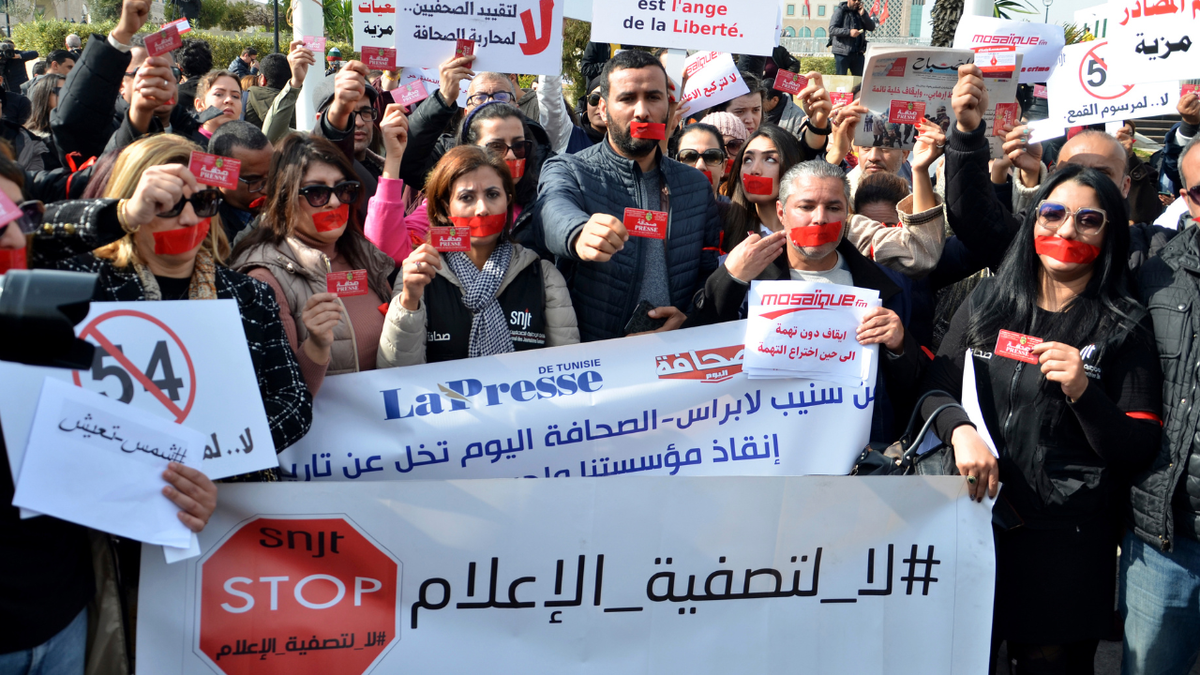Anti-Israel mob attacks journalist covering protest at University of Washington campus
Journalist Jonathan Choe, who was chased down by a mob on the University of Washington campus, recounts the incident and shares his take on anti-Israel demonstrations.
- Two Tunisian journalists were sentenced to one year in prison for criticizing the government.
- Each journalist received six months for disseminating "fake news" and an additional six months for "making false statements with the aim of defaming others."
- Both journalists denied the allegations, citing Tunisia's laws protecting freedom of expression established after the 2011 revolution.
A Tunisian court on Wednesday sentenced two TV and radio journalists to one year in prison for criticizing the government on their programs and on social networks.
Borhane Bsaïs and Mourad Zeghidi were each given six months' imprisonment for disseminating "fake news" and an additional six months for "making false statements with the aim of defaming others," in reference to Tunisian President Kaïs Saied, court spokesperson Mohamed Zitouna said.
The sentences come less than two weeks after both were arrested. They are among a broader group of journalists, activists and lawyers charged under Decree 54, a law criminalizing the dissemination of "fake news" aimed at harming public safety or national defense.
TUNISIAN LAWYERS STRIKE IN PROTEST, ALLEGING TORTURE OF ARRESTED COLLEAGUE
The law, passed in 2022 to fight cybercrime, has been widely criticized by rights advocates who say the offenses are vaguely defined and are being used to crack down on the president's critics.

Journalists display their press cards during a protest highlighting threats to press freedom and the resurgence of authoritarianism, following the arrest of Radio Mosaïque's general manager, Noureddine Boutar, on Feb. 16, 2023, in Tunis. A Tunisian court on Wednesday sentenced two TV and radio journalists to one year in prison for criticizing the government. (AP Photo/Hassene Dridi, File)
Both Bsaïs and Zeghidi denied the allegations. In court, they referred to laws protecting freedom of expression that Tunisia enshrined after its 2011 revolution, when it became the first country in the Middle East and North Africa to topple a longtime dictator. Both said they were simply doing their jobs, analyzing and commenting on political and economic developments in Tunisia.
"I am neither for nor against the president. Sometimes I support his choices, sometimes I criticize them. It’s part of my job," Zeghidi said.
CLICK HERE TO GET THE FOX NEWS APP
Bsaïs, host of the radio show "Emission Impossible" ("Impossible Program" in English) was accused of undermining the president on the air and in Facebook posts made between 2019 and 2022. It's unclear why authorities targeted old posts like his as they pursue a growing number of Saied's political critics.
He defended his opinions and in court objected to being brusquely arrested last week "like a dangerous criminal."
The trial has drawn international condemnation and sparked criticism in Tunisia, where many journalists gathered in front of the court in a show of support.
"We are all on provisional release because any journalistic work can give rise to prosecution," Zied Dabbar, president of Tunisia's National Journalists Syndicate, said of Decree 54. He said 39 journalists have been prosecuted under the law this year.
Saied has faced criticism for suspending parliament and rewriting the constitution to consolidate his own power three years ago. Critics have spoken out against the government’s approach to politics, the economy and migration in the Mediterranean in the years since.









































